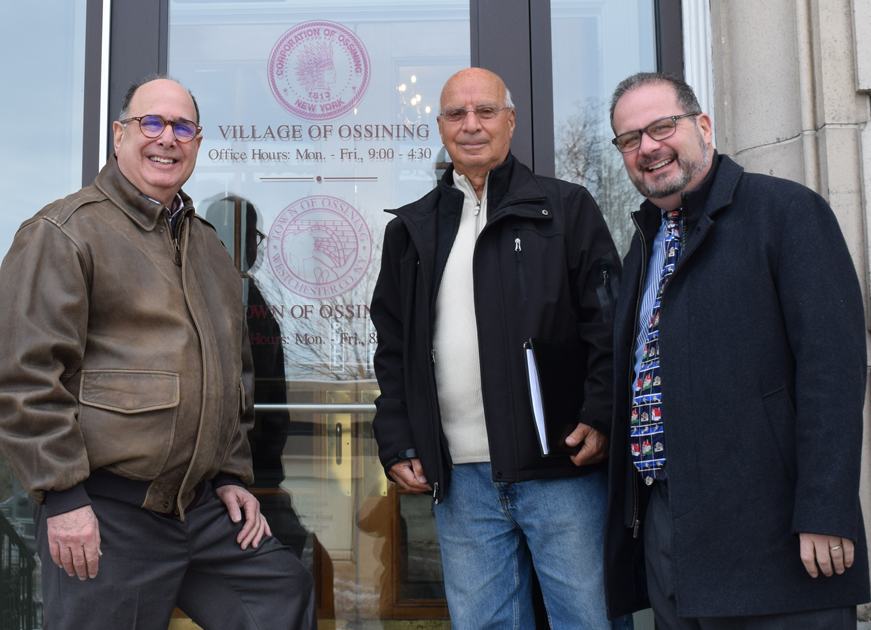Seeing an inequity in the way single-family homes and condominiums are taxed in the town of Ossining, a group is proposing the town board consider an option that would increase property tax rates for condo owners.
Jerry Gershner, Salvatore Carrera and Mark Seiden, representatives of the Ossining Committee for Fair Taxation, have proposed that the town implement the state”™s Homestead Tax Option, which would assess condominiums on their market value, like single-family homes.
The Ossining Committee for Fair Taxation proposes a five-to-seven-year phase-in of the homestead option to keep the increases in taxes from overwhelming condominium owners, something that would require legislation from Albany.
“We”™re not looking to suddenly do something and (say), ”˜Forget what Albany says, let”™s just get the condo people to suddenly go from $8,000 to $15,000 in taxes,”™” said Seiden, owner of Briarcliff Manor-based Mark Seiden Real Estate Team. “We really want to make sure that it is fair.”
Seiden said the phasing-in of the tax increase would mitigate any effects on the condominium”™s market values.

“While real estate taxes are one of the many factors that a buyer will take into account when making a decision where to live, it is far from the only deciding factor,” he said.
Lynn Farrell, a resident of Fox Hill Condominiums in Ossining and member of the Town of Ossining Condominium Association, disagrees.
“Common sense would tell you that (the homestead option) will have a definite impact on resale value of the condos,” she said. “Why would you buy a condo in Ossining if the taxes were the same as a private home? Why would you pay taxes for garbage, roads and lighting and then pay for them again in your monthly common charges?
“If you wanted to live in a condo, you would buy in another community where the taxes reflected the services you received,” Farrell said.
A state law passed in 1981 established the Homestead Tax Option, which prevents any large shift of the property tax burden to residential owners after a revaluation.
Ossining completed the $1.8 million revaluation of its 10,138 properties in 2016, the first such reassessment in 40 years. The project aimed to estimate fair market value for all residential, apartment and commercial properties within the town.
“Now we”™re at a point where everyone is at full market value, with the exception of the condominiums, but that”™s by law,” said Gershner, who is also president of Gershner Realty Associates. “No one gave them a break. The law dictates how condominiums are to be assessed, but they”™re assessed as commercial property, not residential property. That”™s what complicates things.”
According to Ossining Assessor Fernando Gonzalez, there are approximately 1,850 condominium units in Ossining and 6,800 single-family homes. The homestead option”™s implementation would decrease homeowners”™ yearly property taxes by about 8 percent on average, Gonzalez said, while taxes for condominium owners could jump between 40 to 60 percent.
“We have the opportunity to make certain adjustments to those properties which are underassessed by law, particularly the condominiums, and we”™re proposing that that be adjusted and that everyone pay their fair share,” Gershner said.
Gershner said that homeowners are subsidizing condominium owners by paying an increased real estate tax to make up for a condominium assessment valuation shortfall.
“The condominiums are probably taxed at about 40 percent less than a single-family home, and that”™s pretty substantial,” Seiden said.
This is not the first time the idea of reassessing condominiums has come up in the town. In 2015, Ossining chose to move forward with its property revaluation without implementing the homestead option.
“The town board made a decision that the benefit to the individual homeowners was not so great as to outweigh the detriment to folks that own condos,” Farrell said.
Scarsdale, Mamaroneck and the towns of Carmel and Greenburgh decided against implementing the tax option following their respective revaluations in recent years, while Sleepy Hollow and the towns of Rye and Pelham have each adopted the homestead option.
In her 2015 campaign, Ossining Town Supervisor Dana Levenberg said she was opposed to the homestead rule.
“Everyone up for election last year said they were not in favor of homestead,” Farrell said.
Carrera, an independent real estate broker and former director of the county”™s departments of real estate and economic development, feels community sentiment may be different this time around.
“What the homeowners did not get the information on during the reassessment, and (led to) the board not moving forward with the homestead act, is that no one explained to them the amount of savings on a yearly basis the average homeowner would save,” Carrera said.
“This board was elected to serve and represent everyone, not just condo owners, and I think that”™s a very important fact that has to be brought to the attention of homeowners, because there are a lot of condominium owners with associations that come forward and speak their piece,” Carrera said. “We don”™t have that as the individual homeowners, which we will do as we move forward, depending on what this board does.”
Levenberg said the town board plans to gather additional information and schedule a work session or town hall meeting regarding the issue.
“We will have more on that in the near future,” she said.
The town could move forward with the homestead option during a ratio analysis it plans to complete later this year, Gonzalez said. Requests for comment to the Department of Taxation and Finance were not returned at press time.
The Ossining Committee for Fair Taxation hopes the board will open the issue up to a town referendum “to be voted by the people who are going to be paying these taxes,” Seiden said.
“This is not a war against condo owners,” Gershner said. “It”™s just an opportunity to correct the inequality.”






















I would be interested in knowing if the supporters of the Ossining Homestead Option really have done their homework regarding who is supporting condos or single-family residences. Have they considered the following for example: 1. Condominiums usually have less impact on the land use (more open green space, and better rain management); 2. They are built to higher construction codes and are therefore safer; 3. One municipal water connection, as opposed to the miles of pipelines for the single-family residences; 4. One municipal sanitary and storm drainage connection; 5. One municipal road to access many residences; 6.One municipal garbage pick-up for many residents; 5. Condos are usually sprinklered, especially the newer ones; 6. Condos have a smaller carbon foot-print. So I do not see how single-family owners are subsidizing the owners of condos without the facts in place. What are the facts?
Your facts are minimally correct:
1. Perhaps this can be construed as true, however, if you take the same parcel of land, you probably won’t have the quantity of people clustered on it, but you’d have more pervious space.
2. Condo’s are never built to higher standards as they use lightweight truss construction, which easily collapses during a fire. And, those spaces are never sprinkled because it costs more to insulate it.
3. Once water connections are made at whatever “length”, the cost is borne by the builder/resident, and there is less water usage as there are fewer people.
4. Basically, the same answer as #3.
5. The builders build the road and bear the cost. Typically, those roads are then turned over to the municipality.
6. Most co-ops and condos do not have municipal garbage pickup. Rather, they use a private carting company. That’s part of your maintenance fees.
7. (your 2nd #5) Only new condos have sprinklers and not in the crawl space attics. Plus, as an architect (really?), you know the construction/building industry is actively fighting sprinklers in new construction.
8. Smaller carbon footprint? Hah! More people in a tighter space is just congestion.
The “facts” as you presented them are skewed to make the argument you wish to believe. Where is the condo that you live in?
Why should there NOT be differences in tax structures for condos vs. stand-alone homes? They are very different entities and should be treated differently. Condo owners pay for their own garbage pick up, snow plowing and other services. Plus…I would bet that the typical condo owners here are “empty nesters” or childless singles who are not sending kids to Ossining schools either. Condos use far less energy overall, and are easier on the environment Economies of scale create enormous efficiencies. The fact that a Real Estate agent like Seiden supports this movement is baffling and alarming.